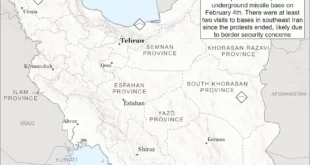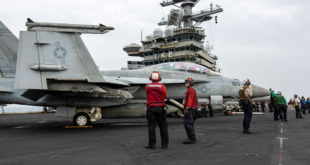The United States, on Thursday night, have announced through Secretary of State Condoleezza Rice and Treasury Secretary Henry Paulson, that they will impose a set of new sanctions against Iran as a pressure to halt nuclear proliferation regarded by Americans as weapons-related. The U.S. sanctions will target the Iranian defense ministry and the Revolutionnary Guard Corps among others.
 ![]()
The measures are perceived as the most severe one against Iran, and also the first time the U.S. has imposed sanctions on an other country’s military. It will forbid U.S. citizens from doing business with the companies they have sanctionned and all their assets will be freezed under U.S. jurisdictions.
Â
The sanctions will also include three of Iran’s biggest state-owned banks – Banks Melli, Mellat and Saderat – accused for being involved in weapons proliferation or financing terrorism. Iran’s defense ministry and the Revolutionary Guards Corps are also being sanctioned for proliferation activity. Another branch being accused, is the elite branch of the guards corps, called the Quds Force, for providing material support to terrorist groups like Hezbollah and Taliban.
Â
Condoleezza Rice said the sanctions were imposed due to Iran’s “unwise campaign†for a nuclear weapons capability, and that the U.S. would still offer Iran civil nuclear power assistance and diplomatic benefits if it gives up its nuclear activity. “If the Iranian government fulfills its international obligation to suspend its uranium enrichment and reprocessing activities, I will join my British, French, Russian, Chinese and German colleagues and I will meet with my Iranian counterpart anytime, anywhere,†she said. She also warned on the other hand that if Iran pursues to confront them, the U.S. and its allies will resist these threats.
Â
The assets of the Revolutionnary Guards are unlikely to be directly vulnerable to the sanctions, however the blacklisting of major Iranian banks will influence other banks to cease doing business with them, according to Stuart Levey the Treausry Undersecretary for Terrorism, thinking that financial institutions around the world do listen to such sanctions.
Â
Peter Feaver, who recently left a staff position at the National Security Council, told the Washingtonpost that the president does not want to be stuck between living with an Iranian nuclear weapon and using military force to prevent Iran from building nuclear weapons. “He is looking for a viable third way, negotiations backed up by carrots and sticks, that could resolve the Iranian nuclear file on his watch or, failing that, offer a reasonable prospect of doing so on his successor’s watch,†Feaver said.
Â
Others view the actions of the administration as a path toward war. Indeed many outside the White House, including the Democrats and ally countries, fear that the president will order airstrikes to eliminate any Iranian nuclear capability.
Â
This decision came as result of the U.S. administration’s frustration with European allies and U.N.members. Russia and China want to wait until the reports of the International Atomic Energy Agency head Mohamed El Baradei and the European Union’s Javier Solana are submitted. The EU also agreed to impose some sanctions outisde the scope of the UN, but have been reluctant in joining the U.S. in using broad measures.
Â
On the other side, Iran has denounced the US sanctions. Mohammed Ali Hosseini, Foreign Ministry spokesman, said that these sanctions violate international law and have no value, therefore they are “doomed to fail.†Iran is insisting that its nuclear program is for peaceful purposes.
Â
Israel, of course has welcomed the decision fearing that Iran’s nuclear weapons program will make Israel lose its nuclear monopoly in the region. Israel Foreign Ministry spokesman Mark Regev said that the sanctions are an important contribution to the international effort to intensify pressure on Iran. While Vladimir Putin, Russian President, has criticized U.S. decision thinking that it will only make the situation worse.
Â
Tensions keep rising between Iran and the U.S.. The nuclear proliferation issue is definitely a very sensitive issue in terms of international security, and therefore relies upon much strategic thinking and trust not allowing much margin of error. Positions of major entities reflect these frustrations. The U.S. has decided to take harder stance on this matter, seeing Iran as a major threat. Others, while not wanting Iran to proliferate, do not want to put as much pressure on Iran, while Iran is insisting that its proliferation is for peaceful purposes. It seems like the issue is set to reamin on the main agenda for a long time.
 Eurasia Press & News
Eurasia Press & News



